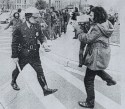A review by Kathleen Sachs, originally published on cine-file
The Nightingale (1084 N. Milwaukee Ave. [Chicago]) — Wednesday [July 26, 2019], 7pm
The poignancy of the three videos included in this program, celebrating the 50th anniversary of the pioneering video collective Videofreex, lies both in how au courant they feel—as documents of a time and place in our domestic history—and in how momentous they still are all these years later, with topics that, then, were pivotally contemporary and now are almost the stuff of lore. Videofreex was co-founded in 1969 by Mary Curtis Ratcliff (who will appear in person), David Cort, and Parry Teasdale after the latter two met at the Woodstock music festival. The group, one of the first-ever video collectives and forerunners of the guerilla television movement, was hired by CBS to produce a program—meant to replace The Smothers Brothers Comedy Hour and titled Subject to Change—about the counterculture, a pilot for which was created but never aired. Two of the three videos in this program, CHICAGO TRAVELOGUE: THE WEATHERMEN (1969, 22 min, Digital Projection) and FRED HAMPTON: BLACK PANTHERS IN CHICAGO (1969, 24 min, Digital Projection), are comprised of footage perhaps intended for the show and are, appropriately, hyper-specific to Chicago. CHICAGO TRAVELOGUE finds Ratcliff and Cort interviewing young people who participated in the Days of Rage, three days of “direct actions” organized by the Weathermen, a faction of Students for a Democratic Society later known as the Weather Underground. During this time, 200-300 protesters (less than expected, which is a topic of conversation in the video) rioted in and around downtown Chicago. The Freex are unrelenting in their interviews, eliciting from their subjects a level of insight into their actions atypical of mainstream media. By engaging in the radical discourse, they create something that acts as a living document—not just a representation of, but rather a manifestation of, the times. It’s interesting to hear young, white radicals discuss their privilege and near-excitement over being arrested; one of the other interviewees challenges their grotesque idealism, resulting in a dialogue that’s relevant as ever. Acting in concert with, or perhaps in opposition to, CHICAGO TRAVELOGUE is FRED HAMPTON: BLACK PANTHERS IN CHICAGO, an intimate conversation with the chairman of the Illinois chapter of the Black Panthers, recorded just over a month before he was murdered by Chicago police. Contrary to the exuberant insubordination on display in CHICAGO TRAVELOGUE, Hampton lays bare a struggle that’s indignant but not self-righteously so, articulating inflexibly the subversive aims of the Black Panthers organization. In the book Videofreex: America’s First Pirate TV Station, and quoted on the Video Data Bank website (the VDB houses and has digitized the entire Freex archive), Teasdale remarks on the at-times unwieldy camera movements: “If our crawling around to frame him from all different angles bothered him, he didn’t let on. He had a message to impart and ignored the distraction.” According to the 2016 documentary HERE COME THE VIDEOFREEX, the Freex, after being fired by CBS, stole back this footage, as well as footage of an interview with Abbie Hoffman. Last but certainly not least is CURTIS’S ABORTION (1970, 22 min, Digital Projection), a video likely made between the Freex’s stint with CBS and the formation of Lanesville TV, which occurred after they moved to a 27-room boardinghouse in Lanesville, New York, in 1971 and launched the first pirate television station. In the video, Ratcliff (with fellow Freex Nancy Cain on screen and Carol Vontobel behind the camera) details an abortion—her third overall, but her first legal one—that took place shortly after the procedure was legalized in New York. Ratcliff’s candidness with regards to how and why she sought the abortion are most captivating, especially considering that it took place years before the 1973 Roe v. Wade Supreme Court decision. It would be unwise to label these videos relics. Rather, they’re an ineffable combination of historical testimony and germane prescience, true now as then, and then as now.








